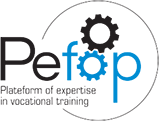Support for a Renewed Vocational Education Policy in Mauritania: A Partnership Framework Agreement is Signed

Friday, January 22, 2016 represents a symbolic day for the International Institute of Educational Planning and its Pôle de Dakar, through its Platform of Expertise in Vocational Training (PEFOP), with the signature of a partnership framework agreement with the Ministry of Employment, Vocational Training and Information and Communication Technology (MEFPTIC).
In the office of the Ministry’s Secretary General, M. Baba ould Boumeisse, the IIEP-Pôle de Dakar Coordinator, M. Guillaume Husson and his host signed this agreement that delineates the development of a programme to support the operationalization of the vocational education policy, that the PEFOP team will develop in Mauritania over the next three years.
The goals, implementation arrangements and parties’ commitments, as well as the programme’s steering, monitoring and evaluation mechanisms were defined and agreed. The signatories expressed their satisfaction with the completion of this first phase of the collaboration between the two entities. For Guillaume Husson, “the formalization of this new support by the IIEP-Pôle de Dakar to the Mauritanian government in the implementation of the vocational education policy complements the spectrum of support provided over several years to Mauritania in the area of education and training sector analysis and planning.”
For his part, the MEFPTIC Secretary General underlined the dynamic nature of the exchanges between his ministry and the IIEP-Pôle de Dakar since the creation of PEFOP in June 2015 and its official launch in November, leading to the agreement.
Although this is indeed only the first step, as mentioned by the Head of PEFOP, M. Naceur Chraiti, who was also present at the signing, “Mauritania is the first of the four partner countries to sign a partnership framework agreement and this is a great stimulus to develop the programme with all of the Mauritanian stakeholders involved. Indeed, the players, representing both the public and private sectors, from both the capital and the regions, met in great numbers for five days (January 25 to 29, 2016) in a participatory context (focus-groups) around the identification and analysis of the obstacles to the operationalization of vocational training that responds to the needs of the economy and favors the professional integration of youth. It is hoped that Côte d’Ivoire, Senegal and Burkina Faso will tread this path very soon.” These four countries are involved in the direct support to the operationalization of vocational education reform. In parallel, a broader network of countries and actors involved in the implementation of vocational education policies in Africa is being composed, and will be moderated to contribute to the promotion and dissemination of best practices.

